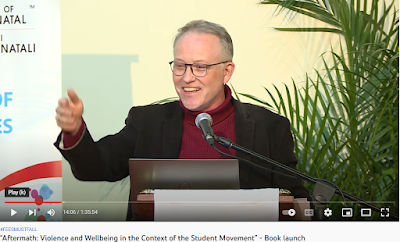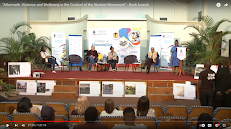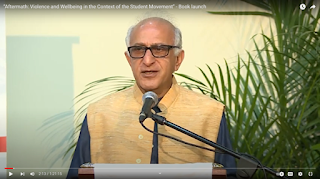
I am so proud to be guest-editing a special issue of the journal Globalisation, Societies and Education with Gritt Nielsen. The topic of the special issue is "Student Activism, Translocality, and Social Justice".
Abstract deadline: 15 December 2022
Manuscript deadline: 15 June 2023
Correspondence: Gritt: gbn@edu.au.dk; Thierry: TLuescher@hsrc.ac.za
Submission link; and link to the journal.
And this is how the topic is described:
"In many countries and universities, students engage in activities to promote social justice through inclusion, diversity, epistemic freedom and decolonisation, paying renewed attention to intersectionalities of race/ethnicity, class, gender and sexuality.
In this special issue, we seek to focus on the translocal dimensions of student activism for equality and greater social justice. We understand ‘activism’ quite broadly to include student-led activities - ranging from small-scale mundane initiatives to large-scale protest events - that aim to change everyday life, practices or norms at the university and beyond. Students’ activist engagement is often shaped in and through translocal / transnational / international / global spaces in which geo-political imaginaries, academic theories, actionable knowledge or symbols, hashtags, materiality and people circulate and move across socio-political contexts. Struggles are connected across multiple scales, and partially common worlds and horizons are created.
Furthermore, public debates and political interpretations of students’ engagement for social justice also tend to be shaped in and through translocal spaces. Students’ activism in one country is compared to and understood in light of the political situation elsewhere, giving rise to political pressure or decisions that can restrict or encourage student political engagement in different ways.
This special issue offers an opportunity to explore the multiple ways in which translocal interconnectivities work to shape students’ political engagement to promote social justice within their university and/or society writ large.
There is a growing literature on transnational social movements, albeit literature on student movements tends to focus historically and currently on the national scale and/or on campus level activism. Similarly, while there is a growing literature on the role of the internet and social media in creating and sustaining translocal networks and solidarities in the form of networked social movements, thus facilitating translocal connective political action, literature on internet-age networked student movements such as #FeesMustFall remains scant. Further analyses are also needed of the translocal dimensions of the more subtle forms of students’ everyday activism, including the ways in which negotiations over use of language or particular practices resonate with or are shaped by, for example, wider social movements, international academic literature or public debates.
We invite contributions based on original empirical research that discuss the translocal dimensions of students’ political engagement. This can include, but is not restricted to, analyses of student activism in relation to:
- The role of social media, e.g., hashtag movements and campaigns, that resonate across institutional/national/local contexts
- Questions of epistemic (in)justice and how knowledge/curriculum is negotiated in relation to e.g., national/international/global contexts or standards
- The production of socio-political imaginaries and horizons (e.g., decolonial, anti-racist, anti-wokeist)
- Converging transnational social movements, including Black Lives Matter and #MeToo
- The shaping of policies, reforms, public debates within and across specific contexts.
- The incorporation/negotiation of particular kinds of vocabulary/ phrases/ languages that relate to a wider translocal (e.g. cultural, political, historical) context
Submissions can also engage in conceptual discussions and theorisation of the role of translocal interconnections in student movements moving beyond dichotomies of global-local to concepts like global forms and assemblages, translocal/transnational, networks, diffusion, scale shift, internalization/ externalization, scaling, worlding, resonance.



















